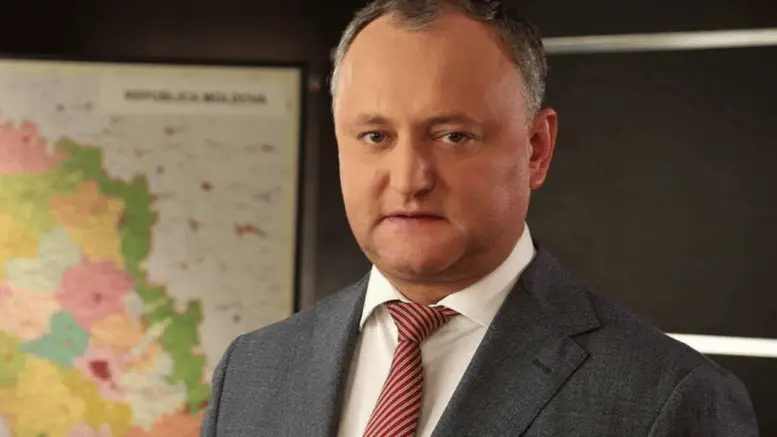Trading One Crisis for Another: Timofti and Dodin
The following is part of a series of resources that seeks to explain Moldova’s current political situation through the biographies of the Moldovan politicians who helped shape it.
Note: There is a certain irony that the Moldovan presidency is an inherently weak position. The Moldovan constitution gives heavy priority to the parliament in running the country. The president is largely a figurehead with no veto power and little ability to direct or control policy. Despite this, the office of the president was the source of a four-year constitutional crisis (from 2009-2014) and is currently the center of a new, growing political crisis (since 2016). These are told below in the biographies of Nicolae Timofti and Igor Dodin.
Also in this series:
- Introduction
- Early Moldovan Independence
- Voronin and the Communists
- The Rise of Vladimir Plahotniuc
- Recent Scandals and Fallout

Nicolae Timofti: President of Moldova 2012-2016, was the last to be elected by parliamentary vote.
Nicolae Timofti
Nicolae Timofti is a former president of Moldova. His election in March of 2012 ended Moldova’s nearly four-year constitutional crisis in which Moldova’s fractured parliament was unable to elect a president. Although he served to the end of his term, his presidency was marred by a billion-dollar financial scandal that saw the pro-EU faction that had supported him fracture further and its public support badly erode.
Born in 1948 in the small northern village of Ciutulesti, Timofti graduated with a law degree from Moldova (Chisinau) State University in 1972. Before his election, he spent his entire career—more than 35 years—in Moldova’s judicial system. He climbed through the judicial ranks, eventually achieving one of the highest positions possible: head of Moldova’s Supreme Magistrate Council. He won many awards and recognitions for his efforts to build a new legal tradition in Moldova.
Timofti became an unlikey compromise candidate selected to end Moldova’s Constitutional Crisis of 2009-2014.
It started when the Moldovan constitution was amended in 2000 to require that parliament elect the president by a three-fifths majority. The amendment was run through by the Communists who had a supermajority to do so – and to elect the president afterwards. This, they felt, would bypass messier direct elections and save money for the cash-strapped state.
However, after the Communists proved unable to solve the country’s pressing problems, their support began slipping. The Moldovan people have, since 2009, voted approximately 50% for Communists / Socialists and 50% for a coalition of Liberal parties which opposes them. Although the constitution does provide for interim presidents (the Speaker of the Parliament or the Prime Minister, in that order), it also requires that snap parliamentary elections be held every year until a president is elected. Thus, an endless cycle of parliamentary elections was triggered and political stalemate was created.
A popular referendum was held in 2010 to amend the constitution again and return presidential popular elections. Polls showed support at over 90% for the referendum. However, due to the long-standing political malaise, political apathy prevailed among voters. Although more than 87% of votes were cast in favor of the amendment, turnout was only slightly over 30%, under the required 33% to be valid under Moldovan law. The results were thrown out and the crisis continued for nearly four more years with the Communists refusing to vote for any candidate proposed by the Alliance for European Integration (AEI), in an attempt to user their minority blocking position to force their own candidate in.
This eventually cost them considerable political capital with voters who came to see it as obstructionism at the expense of the general welfare. Three PCRM deputies eventually volunteered to defect and vote for a non-affiliated, non-political candidate to end the stalemate. The AEI nominated Timofti, who had no political affiliations or experience, but did have a reputation for public service and government work. The three Communists defected to the Socialist Party of Moldova and secured Timofti’s victory.
Timofti’s enjoyed little political capital as president. He pushed for further EU integration, thereby aligning himself with AEI’s central plank. However, with a gridlocked parliament coupled with a largely state-based economy long deprived of consistent leadership meant his goals of advancing European integration or pursing Moldova’s economic and political development were kept out of reach. Much like Ghimpu, he acquired a reputation as someone who mostly served to hand out awards and perform other symbolic acts.
He was also seen as reliant to Vlad Filat, the prime minister who had secured his nomination. When Filat was dismissed by parliamentary vote on charges of corruption, abuse of power and influence peddling, Timofti tried to nominate Filat as acting prime minister in charge of forming a new government. Although this was technically within the letter of the law, many found it illogical that an official just dismissed by parliamentary vote should be, essentially, immediately reinstated. The Constitutional Court, in fact, ruled that it couldn’t be done and Timofti instead nominated a close Filat ally from the same political party.
In 2014, Moldova’s security service declared that Timofti knew about, but turned a blind eye to, bank fraud involving $1 billion (approximately 12 percent of Moldova’s GDP). The money was funneled from three Moldovan banks into the UK and Hong Kong under the guise of shell companies before being transferred into Latvian bank accounts belonging to members of Moldova’s pro-EU elite.
After the scandal broke, between 35,000 and 40,000 protestors gathered in Chisinau to demand early parliamentary elections and the resignation of Timofti, the governor of the national bank, and other officials. Many of the protestors carried pro-EU flags, indicating that their protest was directed towards the Moldovan officials, not their policy of EU integration. However, the scandal tarnished Moldova’s pro-EU elite and helped pave the way for Igor Dodon (see below), a pro-Russia socialist candidate, to come to power in the 2016 elections.

Igor Dodin with Russian President Vladimir Putin and Prime Minister Dimitri Medvedev at a Victory Day parade in Moscow, which marks the anniversary of the end of WWII.
Igor Dodon
Igor Dodon is Moldova’s incumbent President from the Party of Socialists (PSRM).
Born in February 1975, Dodon studied economics at the Agricultural State University of Moldova and received his doctorate in 1998 from the Moldovan Academy of Economic Studies. He joined Moldova’s Party of Communists (PCRM) and first entered politics as Associate Minister of Trade and Economy in 2005. He rose to Minister of Trade and Economy in 2006 and served until 2009, simultaneously holding a post as deputy prime minister from 2008 until 2009. He left his ministry positions after the resignation of Vladimir Voronin in 2009, but then served seven years in Parliament, initially under the PCRM.
In 2011, Dodon ran for mayor of Chisinau, Moldova’s capital, but lost to liberal Dorin Chirtoacă in an extremely tight race – 49.4 vs. 50.6.
Later that year, Dodon left the PCRM in favor of the PSRM as one of three Communists to break ranks and vote for Nicolae Timofti, despite the fact that the Communist leader Vladimir Voronin had called for communist boycott of the vote. Dodon’s act helped end the constitutional crisis that began with Vladimir Voronin’s 2009 resignation. The other two PSRM defectors were former Prime Minister Zinaida Greceanâi and parliamentary deputy Veronica Abramciuc.
Although the constitutional crisis was averted, Moldova’s parliament and government were still badly fractured – split between communists, socialists, and liberals and various groups fighting within those ideologies. Development of the economy and government remained largely stalled.

Dodon with Zinaida Greceanâi and Veronica Abramciuc, announcing their departure from the Communist Party.
In 2016, the Moldovan Constitutional Court prevented any repeat of the crisis by ruling that the Communist-led constitutional amendments of 2000, which initiated the parliament-led presidential process, were unconstitutional. The constitution then reverted back to direct elections.
However, direct elections were still dependent on a badly fractured society. Dodon, a former Communist and current pro-Russian Socialist, won the presidency over pro-EU candidate Maia Sandu in a tight race: 52.2 vs. 47.8.
Moldova’s parliament itself is also badly fractured. It is currently ruled by a pro-EU coalition that includes just 32 members from two parties of the 101 member body that currently contains five parties. Technically, pro-EU parties control 55 seats, slightly less than the 2/3rds legally required to initiate proceedings to remove the president. However, the Liberal Democrats, the third and, in fact, still largest single liberal party, has been kept outside the ruling coalition due to recent scandals and disagreements between liberal leaders. The other 46 seats are held by the Communists and Socialists – who also do not work together as many of the Socialists are deputies that defected from the Communists.
Although Dodon ran on a decidedly Socialist and pro-Russian platform, promising, for instance, to break Moldova’s trade agreement with the EU in favor of joining the Russia-led Eurasian Economic Union. He also pushed for the federalization of Moldova (a resolution supported by Russia). This would represent an attempt to resolve longstanding territorial disputes with Transnistria and Gagauzia by ensuring both their autonomy and their representation on the federal level.
However, Dodon has been largely powerless in office against a liberal-controlled parliament and court system that opposes him.
Dodon denounced Moldova’s Constitutional Court ruling that Moldovan and Romanian are different names for the nation’s official language. Moldovan and Romanian are very similar languages, with minor divergences that appeared mostly while the country was under Soviet control.
Dodon also attempted to protest legislation and ministerial appointments directed by the liberal parliament. The first major showdown occurred after Dodon twice refused to appoint Eugen Sturza as defense minister. Dodon cited Sturza’s complete lack of experience in the defense sector and sent the nomination back to parliament for reconsideration. Parliament re-approved it but Dodon, again, refused to sign.
Constitutionally, Dodon had no right to refuse the appointment the second time. According to Moldova’s constitution, the president may only ask parliament to reconsider a bill or appointment. But if parliament debates and passes the bill again (by the same voting requirements), the president must sign the decision into law.
Historically, the president’s ability to send bills and appointments back to parliament has meant more. For example, when parliament nominated Vladimir Plahotniuc for prime minister, then-president Timofti sent the decision back for “integrity reasons.” The decision was reconsidered and a new compromise candidate – still from Pahotniuc’s Democratic Party, but not the controversial Plahotniuc himself – was nominated. The main difference between the two cases is that Timofti was nominated by the liberal coalition then in control of parliament. Dodon, meanwhile, is from a party opposed to many of that coalition’s central planks.
Moldova’s Constitutional Court ruled that Dodon failed to execute his constitutional duties and suspended him for four days. During that time, Parliamentary Speaker and Acting President Andrian Candu, from the Democratic Party, accepted Sturza’s appointment in Dodon’s absence, approved laws, and otherwise fulfilled the role of president.
Several weeks later, Dodon was again suspended to facilitate the appointment of six more contested ministers. Just days after that reinstatement, the court again suspended him so that a piece of legislation banning Russian news broadcasts could be signed into law.
While it hasn’t officially been dubbed a constitutional crisis, likely as the government has continued to operate, the situation is escalating and calls into question the purpose of the presidency, a position that has caused considerable problems for the country for several years. At very least, the theater of the situation is another demoralizing crisis for the country’s already low political mood. One could also argue that Dodon is likely hoping to further motivate Socialist supporters, who delivered strong results in the previous presidential and parliamentary elections and may do so again in the 2018 parliamentary elections.




